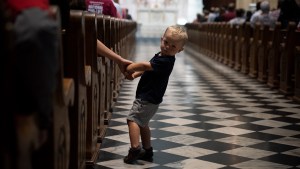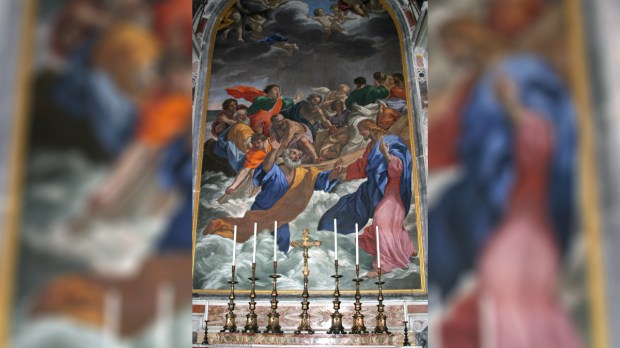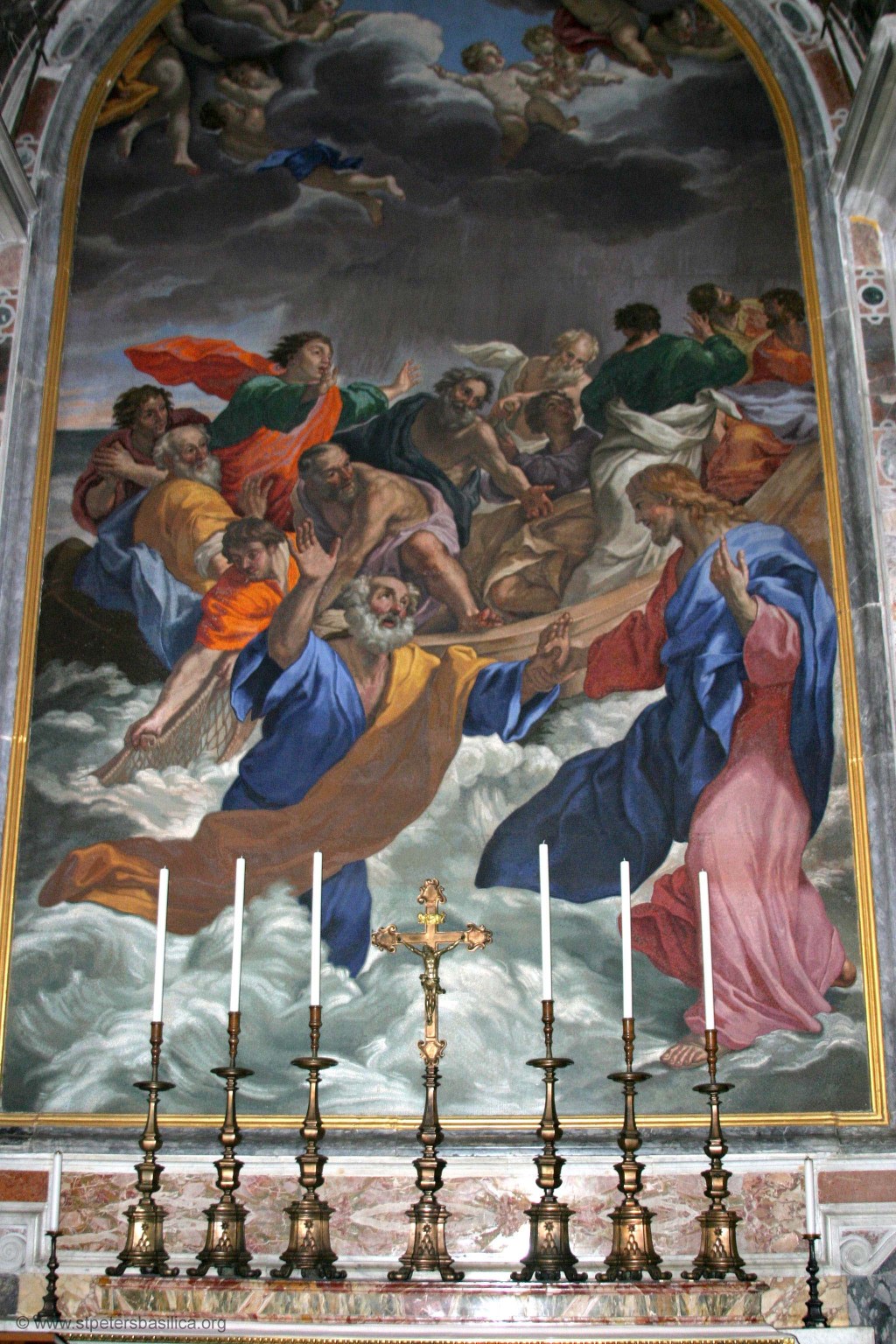I live in Rome and I go to confession at St. Peter’s Basilica. While waiting my turn, I have the chance to gaze at a reproduction of a magnificent painting by Giovanni Lanfranco (1582-1647) gracing the Altar of the Navicella (next to the confessional), which depicts St. Peter walking on the water.
Raising our view
The image draws me in, so colorful and dramatic — you can almost hear and feel the raging storm. Stand too close, you might get wet. And the composition is ingenious, especially the way the other eleven Apostles are shoehorned into the boat. Heaven joins in via a host of angels, and the pulsing energy of the scene is infectious. Jesus stands serenely on the sea, calmly taking hold of Apostle Peter with his right hand while pointing to heaven with his left, wooing Peter to raise his view.
A 9th century Benedictine Bible commentator, Remigius of Auxerre, wrote:
The Lord will be with you to help you when lulling to rest the perils of your trials; he restores the confidence of his protection. For when human frailty beset with difficulties considers the weakness of its own powers, it looks upon itself as in darkness. When it raises its view to the protection of heaven, it immediately beholds the rise of the morning star.
And look what Peter says in his letter: You will do well to be attentive … until … the morning star rises in your hearts (1 Pt 1:19).
But as I contemplated the painting on this particular day, the thing I began to wonder was: Whatever prompted Peter to get out of that boat?
Throwing ourselves into the sea
The saints have pondered this. St. John Chrysostom points out that Peter did not ask, Bid me to walk upon the waters, but rather, Bid me to come to you. It wasn’t supernatural buoyancy he craved but unsinkable closeness. As St. Thomas Aquinas would say, Peter begs Jesus “out of desire alone.” But desire catapulted to a whole new level.
Peter somehow senses that he needs to be the one doing the walking. “How striking that Peter does not plead for Jesus to come to him,” observes Erasmo Leiva-Merikakis, “but rather begs Jesus to invite him to come out to him over the waters.” Even as the storm erupts around them, a profound conviction erupts within St. Peter. “Peter believes that by the will of his Master he will be able to do that which by nature he cannot do” (St. Jerome).
And he acts on that belief. St. Teresa of Avila wants us to know: “I have often thought that St. Peter lost nothing by throwing himself into the sea, even though later he was afraid. These first impulses are a great thing.”
So then why don’t I do it? St. John Henry Newman knows why:
But it is seldom we have the heart to throw ourselves, if I may so speak, on the Divine Arm; we dare not trust ourselves on the waters, though Christ bids us. We have not St. Peter’s love to ask leave to come to him upon the sea. When we once are filled with that heavenly charity, we can do all things, because we attempt all things — for to attempt is to do.
How to walk on water
It’s simply a property of divine providence, as St. Thomas Aquinas counsels, that “the Lord sometimes permits the strong to be submerged in the danger of the sea.” We’re not flailing in the water because we are weak; we are submerged to strengthen our strength. The grace of our baptism surges on. Simone Weil wrote:
God made it so that his grace, when it penetrates to someone’s very center and illuminates their whole being, permits that person to walk on water without violating the laws of nature. But when someone turns away from God, they simply give themselves over to gravity. Then they believe they will and choose, but they are only a thing, a falling stone.
After catching Peter, Jesus asks, Why did you doubt? The word “doubt” means literally “to be of two minds.”And the way to overcome that division, as Remigius told us, is to raise our view to the protection of heaven, letting God’s grace penetrate to our very center. Then the Rock can float.
“The Lord is always close, being at the root of our being,” observed Servant of God Romano Guardini. Yet
we must experience our relationship with God between the poles of distance and closeness. By closeness we are strengthened, by distance we are put to the test. Even before we seek the Lord or invoke him, it is he himself who comes to meet us, who lowers heaven to stretch out his hand to us and raise us to his heights; all he expects of us is that we trust totally in him, that we really take hold of his hand.
I gaze upon that beautiful painting … Jesus coming to meet me, lowering heaven with its protection, stretching out his hand, expecting me to trust totally in him. I take hold of his hand, and go in to confess my sins.
~
Find Fr. Peter John Cameron’s reflection on the Sunday Gospel each week here.



